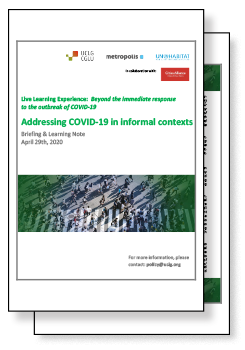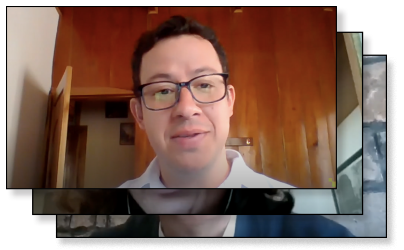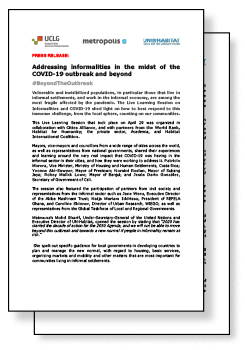Informalities
Under-Secretary-General of the United Nations and Executive Director of UN-Habitat:
Director of Cities Alliance
UCLG Secretary General
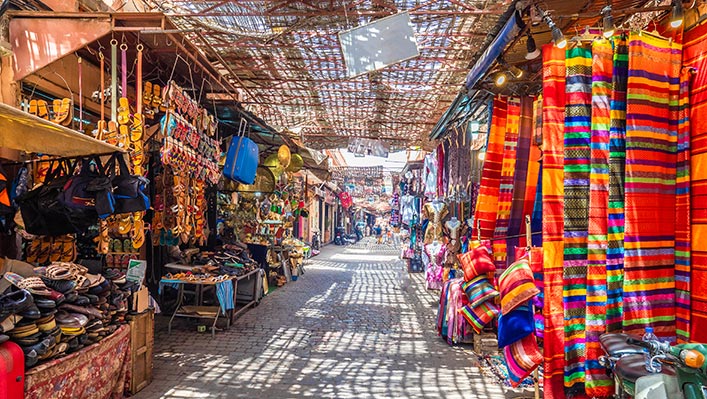
Context
It is estimated that at least one quarter of the world’s urban population, about 1 billion people, live in informal settlements. It is also estimated that 60% of all workers are informally employed – that means that about 2 billion women and men worldwide are currently deprived of decent working conditions and legal protection. The spread of COVID-19 is disproportionally affecting these already vulnerable communities. It is estimated that 1.6 billion informal workers have been significantly impacted by the crisis. Access to proper housing and a safe household environment are key if social isolation measures are imposed. Similarly, many informal workers are likely be deprived of their income during the pandemic, being exposed to a condition of extreme vulnerability. As with other issues, COVID-19 has simply shed light on and exacerbated the vulnerability of these communities and has made it even more urgent to address such pressing issues.
1B
1 billion people live in informal settlements.
60%
60% of workers worldwide are informally employed.
Challenges

Perhaps the main challenge concerning informality is that formal measures being adopted to contain the spread of the virus, or even government aids to support communities, are not applicable to those living and working in informal conditions. If governments’ responses to the crisis are focused solely on those living and working in formal conditions, a large portion of the population would remain unassisted. In that sense, one of the main challenges being faced by local authorities is to find proper ways to reach those living and working in informal settings in order to ensure their livelihoods and prevent the exacerbation of poverty and inequality.
Needs

A whole new strategy of urban planning and development is needed to improve infrastructure and public health in informal settlements. As a first step, local authorities need to acknowledge and engage with these vulnerable communities, building up inclusive coalitions supported by a policy environment that enables local action. Local authorities must be the advocates of those living in informality and voice their needs to national leaders. Equally important is the need to engage with those in an informal work context to establish response strategies that reflect their particular needs. As we prepare to build back better, we must do it from the beginning, designing recovery policies hand in hand with those communities.
Responses

This is how Costa Rica is using geo-statistics to inform national and local action plans
Freetown is working with communities to improve the way in which they communicate measures to prevent the spread of the virus
Subang Jaya is working to acknowledge the informal sector and integrate it to the social fabric
Responses
This is how Costa Rica is using geo-statistics to inform national and local action plans.
Subang Jaya is working to acknowledge the informal sector and integrate it to the social fabric.
Key Takeaways
- Acknowledging informality as an integral part of cities is the first step to start creating effective, inclusive approaches to respond to the pandemic and to build back better, making sure no one and no place is left behind.
- Engaging with local communities from the earliest stages of prevention and response measures, as well as of long-lasting strategies, are key to develop measures that address the particular needs of those communities.
- Monitoring what solutions informal workers have been developing in the midst of the pandemic is a good way to think of local support measures that fit their local context.
- Amongst those living in informality, special attention should be given to the most vulnerable groups – such as women, children and the elderly – to make sure they are protected during and after the pandemic.
Beyond
The Outbreak

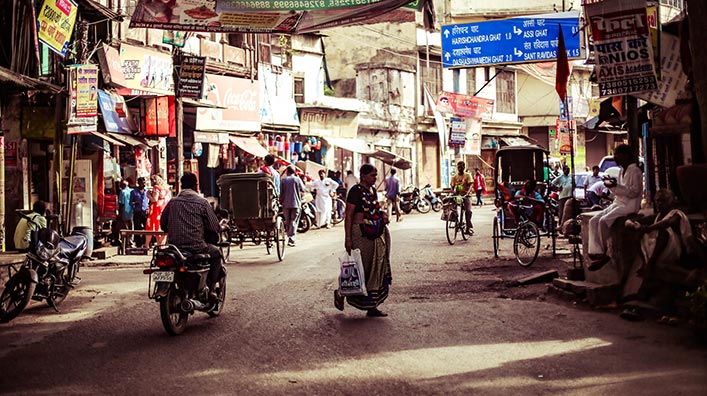
Building
Back Better
The UCLG Decalogue

Resources

For further information on the topic of Informalities and its impact on cities and regions, please refer to the related resources included below.

